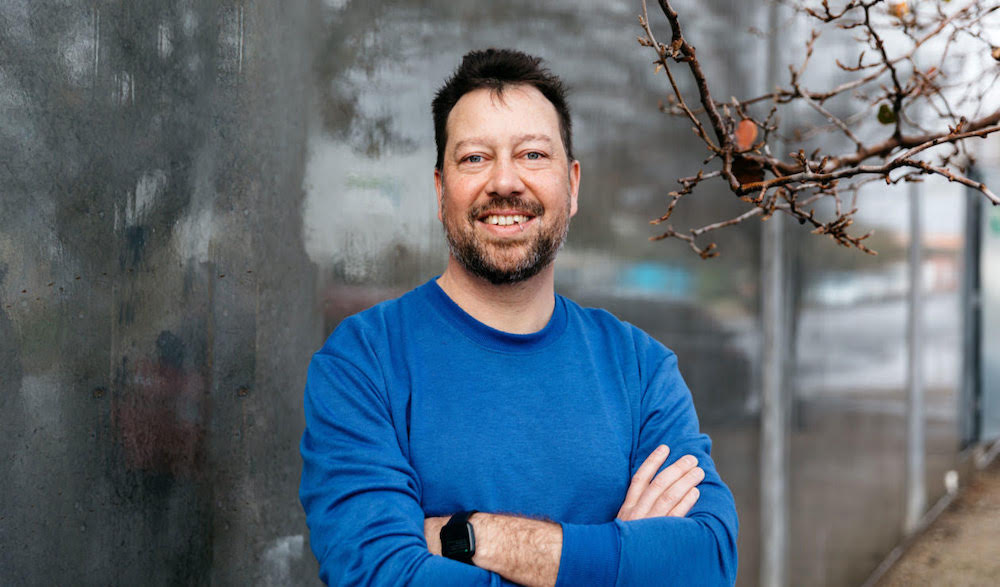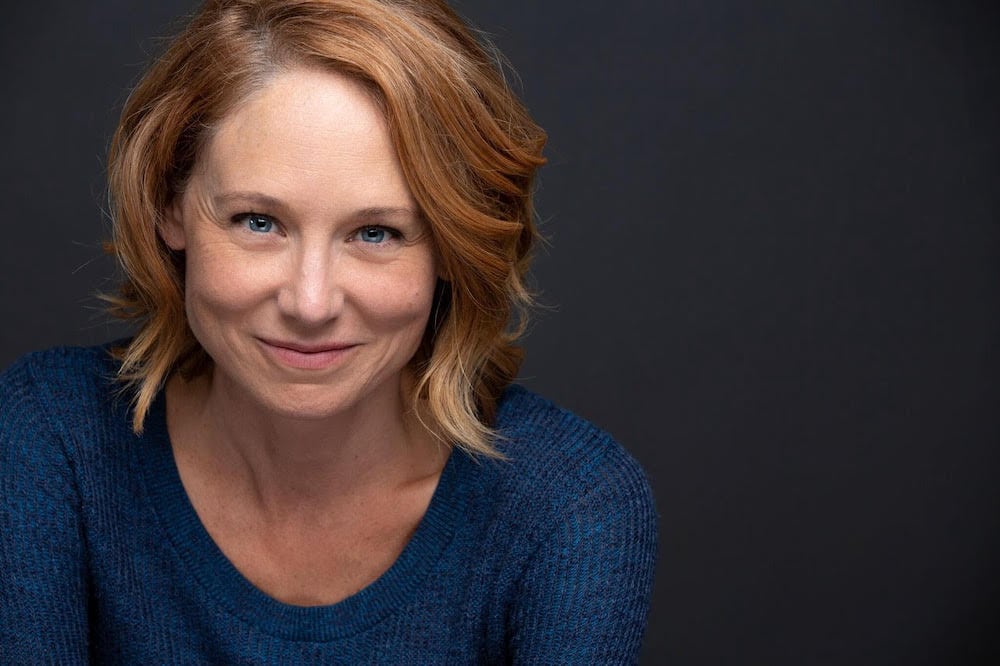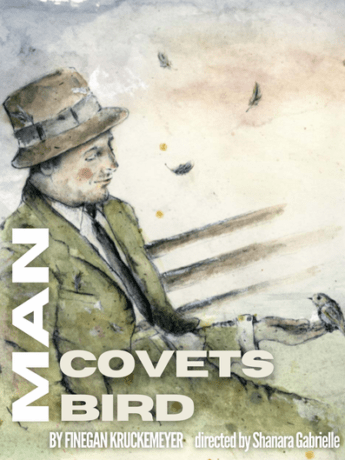Interview with the playwright by Roberta Alves
Spooky Action Theater will soon open Man Covets Bird — a fantastical play for tweens, teens, and up — by critically acclaimed Australian playwright Finegan Kruckemeyer:
A boy wakes one day and finds he is a man. He can recognise the stranger in the mirror, but his parents, his town, they cannot. He finds a bird that cannot fly, and together they take off on an amazing adventure. In a city they come across, they begin to build a nest, a nest that is big enough for a man and a bird. But a city is a busy place and nest-building is a big job, and soon there are other things to do. This story, told through pearly prose, live music, melancholia, and sunshine, is about flying from nests, birdsong, the nature of man, wild things, and growing up.

Your mother was from England, your father from Germany, you were born in Ireland and have been living in Australia since you were a child. How do all these different cultures influence your writing?
Finegan Kruckemeyer: I don’t knowingly write from different cultural perspectives, but how they probably do manifest is through notions of multiplicity, and the fact that there are many sides to everyone (whether cultural, emotional, whatever). So having been shaped by various places and people — who have themselves been shaped by many places and people — I have to acknowledge that my perceptions of the world are broad things informed by broad influences, and celebrate the fact that every character’s should be too.
You lived in Tasmania for many years, how did the landscape influence your work and why Tasmania?
I did indeed have a lovely 15 years of living on the island, but recently my wife, son, and I returned to Adelaide, site of my late childhood and teen years. Tasmania was discovered when Essie and I were just courting, and wanting to find somewhere in which to build a new life. We traveled there young and poor and aspirational, learnt things big and small, forged lives, had our beautiful son. Moe, and have now returned a bit older, a bit comfier, hopefully no less aspirational. The adventure was a pleasure, the homecoming is a joy, and it all feels nicely reminiscent of the play we’re chatting about!
Would you consider yourself a writer of plays for young people? Was that a choice you made it or did it just happen?
No. I do think the cornerstones of TYA [Theatre for Young Audiences] — those of fantastical permissions and poetic language and childhood thresholds — aren’t exclusively for kids, and an adult sat in the audience should be afforded just as much space to invest in the story too, whether as a nostalgic memory exercise or an allegorical prism through which to consider their own lives in the here and now.
What are the challenges in writing for young people compared with adults?
How to convey more with less, maybe, and the acknowledgment that you want to tell a human-sized story for someone with a child-sized vocab. So the effort lies in finessing the language without dumbing down the themes or triumphs or hardships.
How did you find the inspiration to write Man Covets Bird?
It was a beautiful, tender picture with the same name by an artist called John Lurie. The commissioning company [Slingsby theater in South Australia] showed me the image and asked me to invent the context of this man and bird’s life, their befores and afters, the journeys they might have had. And I sat down and began typing…

Man Covets Bird was originally written for one actor, but it has been done in various ways. In Spooky Action’s production, there are three actors on stage. How do you feel about this?
I love the different tellings of a tale! I’m not a director or a designer or a composer, so to offer something as definitive as text on a page to a talented ensemble, and then later sit in a theater and see it brought to life by an ensemble (one or many) and with a score (large or small) and in a world (grand or intimate), feels like a true gift. The script I already know — the surprises are what I most enjoy.
In Man Covets Bird we follow the journey of a man who decided to go to the city with a bird. How would you describe his journey? During the pandemic, most people decided to make the opposite journey, leaving the city to go to small towns, since they could work from anywhere. How do you see these new “journeys”?
The specifics of a landscape are less important for me, and what feels significant in this story for me is the thresholds. The nearly-man begins on a cusp of meeting himself. He awakens as a stranger, finds a companion, and embarks on a quest of self-discovery. You’re right about the pandemic having been a huge schism in many people’s lives, one that made them assess what they were doing, where they were living, what they were missing or savoring. And then (if the opportunity was there, which for many it sadly isn’t) altering their lives as they needed. Whatever form that recalibration of a life might take, at whatever age one does it, is for me inherently interesting and has the potential to be wonderful.

What kind of lessons do you expect/hope our audience in DC would “learn” from Man Covets Bird?
None at all. I never wish to presume what an audience (particularly a young audience who’s so often preached to) takes away from one of my stories — whatever they think it is about, or feel it left them with, is correct.
In your most recent play Hibernation, governments around the world ask people to bunker down at home to reduce their carbon footprint. The idea came before we actually had to lockdown at home due to the COVID-19 pandemic, so how did you have the idea? What was your first thought when we actually had to bunker down? And how do you think the pandemic improved or worsened problems like climate change, disparity, poverty, etc.?
It was a very weird thing! I started writing back in November 2019 — one of those strange ideas that popped into my head pretty well-formed — and then in February the world did indeed shut its curtains and demand a hibernation of sorts from us all. Happily, my first thought upon bunkering down was one of contentedness (about the people I share my life with, the closeness and health of family, the stability of my society compared with others, the love of quiet times anyway). And then the next thought, as time went on, was one beyond my immediate comforts, and of the world and its calamities and the vast swaths of humanity who have it harder.
So the pandemic improved things by bringing those disparities to the surface, and being a call to arms for what we need to do to consider the global population and the environmental dangers. But it worsened things by meaning many had to feel those effects in real time, in real lives.
Is there still hope for our children?
There is always hope. And I’d argue not just for our children, but more potently because of them. They are wise and aware and vocal, and I think we need to share the power and the discourse accordingly.
How did you “live” the COVID-19 pandemic personally and professionally? How do you think it will affect theater in the long run? Are you excited with theater returning to in-person?
I lost a lot of work, but I gained a lot of time. Theatermakers and watchers suffered so great an impact — as did so many other communities (I think it’s important to see our sector in relation to everyone else in society who weathered their own storms too). I’m really heartened by theaters opening again, for the sheer joy that comes with existing communally, of sitting together in a space and sharing a story and a moment in time. The pandemic gave us time to self-assess, to deduce our own small place in the world. Now the next chapter is one of coming back together with friends and loves and strangers, and I do believe theater is a pretty great vehicle for that.

COVID Safety: Audience members will show proof of full COVID vaccination before entering the theater. Both audience members and theater staff will wear masks at all times while inside the building.
ROBERTA ALVES is Spooky Action Theater’s marketing and communications manager.
SEE ALSO:
Spooky Action announces three plays for live reopening (season announcement)




